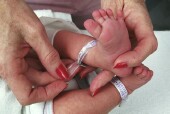Docs Should Tell All About Cord Blood Banks
New guidelines say differences between nonprofit, for-profit banks should be explained.
|
E-mail this article
Subscribe to news
Printer friendly version
|

(SOURCE: American College of Obstetricians and Gynecologists, news release, Jan. 31, 2008)
THURSDAY, Jan. 31 (HealthDay News) -- Doctors should tell pregnant patients considering umbilical cord blood banking about the advantages and disadvantages of public versus private cord blood banks, new guidelines state.
The American College of Obstetricians and Gynecologists (ACOG) issued its revised Committee Opinion in the February issue of Obstetrics & Gynecology.
The ACOG also said doctors who recruit patients for for-profit cord blood banks should disclose their financial interests or other potential conflicts of interest to patients and their families.
Initially, private facilities were developed to store umbilical cord blood stem cells from newborns for potential future use by the same child or a family member in case of disease. But there are now public banks that store, for free, stem cells that can by used by anyone who needs them.
"Patients need to be aware that the chances are remote that the stem cells from their baby's banked cord blood will be used to treat that same child -- or another family member -- in the future," Dr. Anthony R. Gregg, chairman of the ACOG's Committee on Genetics, said in a prepared statement.
The ACOG also recommends that doctors inform patients that there is no reliable estimate of a child's likelihood of using his or her own saved cord blood later in life. Experts estimate the likelihood at one in 2,700, or even lower. Patients should also be advised that it's not known how long cord blood can successfully be stored.
In addition, pregnant women need to be told that cord blood stem cells can't be used to treat genetic diseases in the same child from which they were collected, because those stem cells would have the same genetic mutation.
"Cord blood collected from a newborn that later develops childhood leukemia cannot be used to treat that leukemia for much the same reason," Gregg said.
More information
The Nemours Foundation has more about banking cord blood. 
Copyright © 2008 ScoutNews, LLC. All rights reserved. 
HealthDayNews articles are derived from various sources and do not reflect federal policy. healthfinder.gov does not endorse opinions, products, or services that may appear in news stories. For more information on health topics in the news, visit the healthfinder.gov health library.